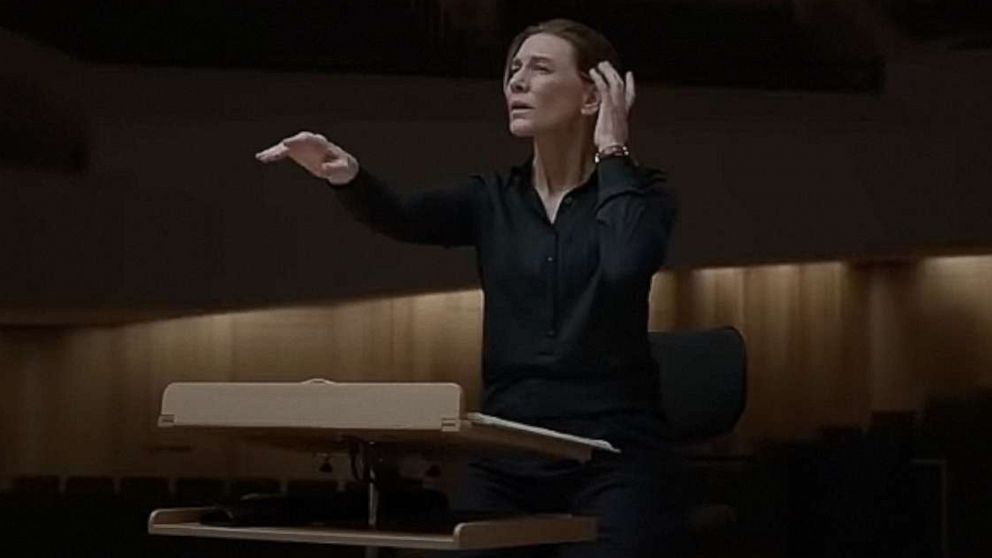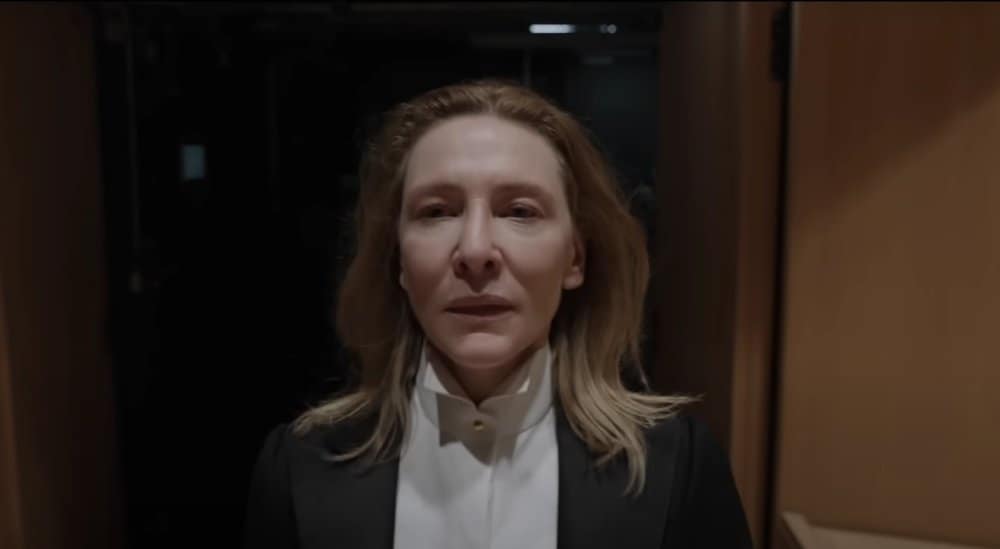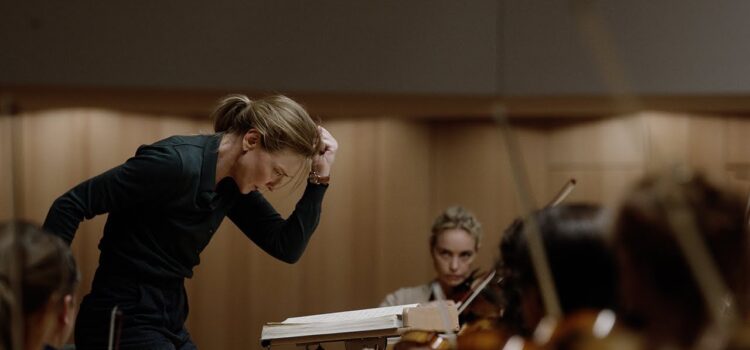By Lynn Venhaus
It is easy to be dazzled by Cate Blanchett’s virtuoso performance as a brilliant maestro whose rise in the cutthroat world of classical music will be thwarted by a spectacular fall from grace.
But overall, the excruciatingly bloated melodrama “Tar” is a pretentious exercise.
Set in the international world of classical music, the film centers on Lydia Tár, widely considered one of the greatest living composer-conductors and first-ever female music director of a major German orchestra. But just as her professional career is soaring, her personal life is going to crash, and she is in danger of getting burned.
As played by the two-time Oscar winner, the unsympathetic Lydia is at once brilliant and brittle. Haughty and vain, her carefully cultivated image is going to take big hits in the age of social media outrage and swift cancel culture, for –spoiler alert – she’s a sexual predator.
Cavalierly, she wields power over the vulnerable women she grooms while they curry favor with her. But she doesn’t attend to the messiness that will expose her true nature, and this fatal flaw, for being arrogant enough to think she is untouchable, will be her downfall.
Yet, there is no redemption and little accountability. We’re not going there, but where we’re going is a rather muddled and bumpy journey where we’re kept at arm’s length.
However, Blanchett is fierce as the formidable composer and conductor. She conducts with a ferocity, plays piano nimbly, and speaks several languages. She is on screen nearly the whole 2-hour, 38-minute runtime (which feels like 6 hours), and she’s a thoroughly unlikable character.

The acting is uniformly first-class, as are the production elements moving us between her homes, the concert hall, and the streets of Berlin, New York, and Thailand. Florian Hoffmeister’s cinematography captures the moodiness, the bleak gray skies, and growing unease as well as the upper echelon in the arts and the associated lofty lifestyles that production designer Marco Bittner Rosser has conveyed so well.
The main frustration here is that writer-director Todd Field has decided to concentrate on repetitive minutiae with a backdrop of mundane everyday life details, which drags the story.
At home, she lives with her wife Sharon, the Philharmonic’s concertmaster (an outstanding Nina Hoss), and their daughter Petra (Mila Bogojevic), but she also keeps another place.
And not only is the film’s pacing uneven, but Field is stingy with answers while questions keep proliferating. By the time it’s over – sweet relief (and some of the movie seems in real time) — there are baffling loose ends that prevent it from being a satisfying experience.
That seems indulgent, and a lengthy opening lecture with the New Yorker’s Adam Gopnik and a master class at Juilliard are in desperate need of editor Monika Willi (wait – there is an editor listed in the credits?).
Field, a three-time Oscar nominee who hasn’t made a film in 16 years, isn’t clear about his feelings for the protagonist, or how he wants us to feel. Normalizing her would be a mistake, for she’s a monster. Nor is she deserving of a pity party. Her undoing is entirely her own fault.
For those of you playing at home, do we want to watch a prickly personality pontificate for several hours?
Time and time again, life shows us that you can only run so far before fate catches up with you. What should happen – a comeuppance, criminal charges, civil lawsuit, apology?
That is not where Field is headed. Nor is he compelled to flesh out the vague backstory of Krista (Sylvia Flote), a supposedly ‘unstable’ protégé who committed suicide.
As a fan of Field’s acclaimed “In the Bedroom” (2001) and “Little Children” (2006), this was confounding. But others accept it and have lavished widespread praise. I would hope a second viewing isn’t needed for more insight and clarity.
The music, of course, is gorgeous. Composer Hildur Guðnadóttir, whose work on “Joker” won her an Oscar, may earn another nod with this sleek score. Mahler’s Fifth Symphony, as the chosen piece to record, is sumptuous.
Other noteworthy performances include Noemie Merlant as Tar’s assistant Francesca and Sophie Kauer as the hotshot young cellist.
There is a story, of course, in the intriguing take on male-female power dynamics, and out-of-control actions made worse in the era of cellphones and social media. And suspense does build, if only in fits and starts.
Full of nagging holes, “Tár” is imperfect, and that’s not acceptable, no matter how sophisticated, given the people associated with this project.
It again, if anything, raises the issue about separating the art from the artist, but that opens a dialogue best served in another more succinct movie, as who wants another paradox after this disturbing – and cumbersome — portrait?

“Tar” is a 2022 drama written and directed by Todd Field. It stars Cate Blanchett, Nina Hoss, Mila Bogojevic, Noamie Merlant, Sophie Kauer and Mark Strong. It runs 2 hours, 38 minutes, and is rated R for some language and brief nudity. Locally, it opened in theatres Oct. 21. Lynn’s Grade: C.

Lynn (Zipfel) Venhaus has had a continuous byline in St. Louis metro region publications since 1978. She writes features and news for Belleville News-Democrat and contributes to St. Louis magazine and other publications.
She is a Rotten Tomatoes-approved film critic, currently reviews films for Webster-Kirkwood Times and KTRS Radio, covers entertainment for PopLifeSTL.com and co-hosts podcast PopLifeSTL.com…Presents.
She is a member of Critics Choice Association, where she serves on the women’s and marketing committees; Alliance of Women Film Journalists; and on the board of the St. Louis Film Critics Association. She is a founding and board member of the St. Louis Theater Circle.
She is retired from teaching journalism/media as an adjunct college instructor.




